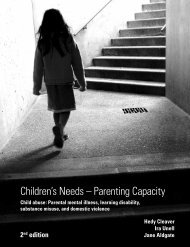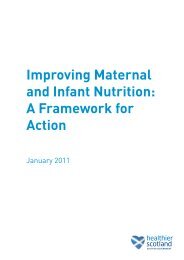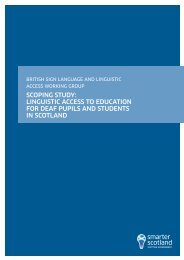- Page 1:
TheCarloway ReviewReport andRecomme
- Page 4 and 5:
highly disruptive to the system gen
- Page 9:
LIST OF ABBREVIATIONS1995 Act The C
- Page 13 and 14:
1.0 INTRODUCTIONBackground1.0.1 In
- Page 15 and 16:
a solicitor” prior to, and at any
- Page 17 and 18:
ole of the Group was to provide the
- Page 19 and 20:
of the points made at each of these
- Page 21 and 22:
Topics outwith the scope of the Rev
- Page 23:
Convention, describes the overall v
- Page 26 and 27:
Justice-Clerk (Inglis) stated to a
- Page 28 and 29:
arrest and liberty. There was nothi
- Page 30 and 31:
he/she does not do so, he/she risks
- Page 32 and 33:
e a matter of fact to be determined
- Page 34 and 35:
question the suspect until he/she b
- Page 36 and 37:
Committee’s report when read as a
- Page 38 and 39:
ultimate arbiter of constitutionali
- Page 40 and 41:
was cautioned, but not told that he
- Page 42 and 43:
at the whole circumstances of the c
- Page 44 and 45:
Cadder2.0.35 Mr Cadder was aged 16
- Page 46 and 47:
2.0.39 Compelling reasons would hav
- Page 48 and 49:
2.0.44 These guidelines were supers
- Page 50 and 51:
first required to have been “subs
- Page 52 and 53:
The long term implication of this,
- Page 54 and 55:
and of society as a whole. The purp
- Page 56 and 57:
giving rise to the reasonable suspi
- Page 58 and 59:
3.0.15 The right of silence and the
- Page 60 and 61:
complacency must be avoided and the
- Page 62 and 63:
unlawful for a public authority to
- Page 64 and 65:
4.0.3 In short, the Review has gras
- Page 66 and 67:
The System4.0.7 The recommendations
- Page 68 and 69:
window during which these investiga
- Page 70 and 71:
operates in a context where the hum
- Page 73 and 74:
5.0 CUSTODY CHAPTERS OVERVIEW5.0.1
- Page 75 and 76:
next step, as quickly as possible.
- Page 77 and 78:
5.1 ARREST AND DETENTIONIntroductio
- Page 79 and 80:
5.1.6 The Review has considered whe
- Page 81 and 82:
Arrest without warrant5.1.9 A polic
- Page 83 and 84:
5.1.12 It was because of this lack
- Page 85 and 86:
5.1.15 Reasonable suspicion permits
- Page 87 and 88:
arrest, without warrant, any person
- Page 89 and 90:
interview. The Court stated that th
- Page 91 and 92:
of the suspect and subsequent crimi
- Page 93 and 94:
appropriate ground for both arrest
- Page 95 and 96:
justified by the evidence gathered
- Page 97:
(d) may destroy evidence, interfere
- Page 100 and 101:
Current law5.2.3 In terms of sectio
- Page 102 and 103:
5.2.5 Particularly in view of the t
- Page 104 and 105:
individuals were being detained wit
- Page 106 and 107:
significant crimes, reflected that
- Page 108 and 109:
ConsiderationThe period before char
- Page 110 and 111:
the investigation and prosecution o
- Page 112 and 113:
ignored. There are about 100 detent
- Page 114 and 115:
5.2.26 Scotland is a small jurisdic
- Page 116 and 117:
5.2.29 Continuing with the custody
- Page 118 and 119:
5.2.32 The sheriffs principal and s
- Page 120 and 121:
jurisdictions where judicial or oth
- Page 122 and 123:
where they are uncertain of what th
- Page 124 and 125:
122
- Page 126 and 127:
The grounds for arrest and initial
- Page 128 and 129:
procurator fiscal consider that the
- Page 130 and 131:
the standard bail conditions and, i
- Page 132 and 133:
prudent, therefore, to constrain an
- Page 134 and 135:
to challenge any conditions before
- Page 136 and 137:
⎯ the exercise of the powers to l
- Page 138 and 139:
the nature and scope of police ques
- Page 140 and 141:
suspect the right of access to an a
- Page 142 and 143:
involving the suspect having inform
- Page 144 and 145:
6.1.3 It was essential that the Rev
- Page 146 and 147:
6.1.7 In Ireland 7 , a suspect in c
- Page 148 and 149:
lawyer at that stage, although the
- Page 150 and 151:
detained suspect must have prompt a
- Page 152 and 153:
interview. That is the general posi
- Page 154 and 155:
doubt remain dependent upon the sta
- Page 156 and 157:
of non-qualified persons posed a pr
- Page 158 and 159:
eing interviewed, or otherwise hind
- Page 160 and 161:
proportionate. If a conflict does o
- Page 162 and 163:
6.1.36 In England and Wales, resear
- Page 164 and 165:
context and returning to the genera
- Page 166 and 167:
Waiver6.1.41 The European Court has
- Page 168 and 169:
until shortly before his/her attend
- Page 170 and 171:
⎯ the right of access to a lawyer
- Page 172 and 173:
and whether there is sufficient evi
- Page 174 and 175:
the degree of suspicion, and to adv
- Page 176 and 177:
is detained 7 . Regardless of wheth
- Page 178 and 179:
at the diet of trial to exclude his
- Page 180 and 181:
police elect, for whatever reason,
- Page 182 and 183:
sense, are inadmissible if objected
- Page 184 and 185:
the suspect’s right to silence an
- Page 186 and 187:
and reliable, e.g. to clear up ambi
- Page 188 and 189:
“would have such an adverse effec
- Page 190 and 191:
6.2.38 As noted above, section 78 o
- Page 192 and 193:
ensure that reasonable lines of enq
- Page 194 and 195:
determining fairness in certain cas
- Page 196 and 197:
permission to do so. The applicatio
- Page 198 and 199:
hour maximum detention period, in a
- Page 200 and 201:
incrimination. It should be specifi
- Page 202 and 203:
accused’s first appearance on pet
- Page 204 and 205:
202
- Page 206 and 207:
Current law6.3.4 For the purposes o
- Page 208 and 209:
to a Hearing or prosecuted in court
- Page 210 and 211:
ight of access to the child, subjec
- Page 212 and 213:
Constabulary on the conditions in w
- Page 214 and 215:
he/she has a specific right to “p
- Page 216 and 217:
general thrust of what is said by t
- Page 218 and 219:
6.3.21 In many jurisdictions 43 a c
- Page 220 and 221:
6.3.25 This means that any child su
- Page 222 and 223:
police interviewing a child at his
- Page 224 and 225:
to listen to any advice given. If h
- Page 226 and 227:
224
- Page 228 and 229:
Current LawDefinition6.4.3 There is
- Page 230 and 231:
legislation 6 , both of which stres
- Page 232 and 233:
he/she 9 : “may not understand th
- Page 234 and 235:
specific statutory rules which make
- Page 236 and 237:
of his/her replies because of an ap
- Page 238 and 239:
7.0.3 Throughout the course of the
- Page 240 and 241:
7.0.8 The Review looked at the admi
- Page 242 and 243:
240
- Page 244 and 245:
which does not hold when there is a
- Page 246 and 247:
We have already directed that witne
- Page 248 and 249:
persuade the populace of the validi
- Page 250 and 251:
punishments than those exigible on
- Page 252 and 253:
tenets. Indeed, even the judiciary
- Page 254 and 255:
He concluded 50 :“Although two wi
- Page 256 and 257:
does then, in each individual case,
- Page 258 and 259:
will look at the evidence at trial
- Page 260 and 261:
accused as the perpetrator of the c
- Page 262 and 263:
7.2.11 After what might be describe
- Page 264 and 265:
Practical Considerations7.2.15 How
- Page 266 and 267:
7.2.18 It may seem immediately appa
- Page 268 and 269:
Distress7.2.21 Similar consideratio
- Page 270 and 271:
The Convention7.2.23 Article 6 of t
- Page 272 and 273: 7.2.25 The rules concerning the nee
- Page 274 and 275: finding tribunals are, with rare ex
- Page 276 and 277: cases which had been instructed for
- Page 278 and 279: the criminal justice system. Removi
- Page 280 and 281: The more difficult issue, however,
- Page 282 and 283: more persuasive than a multiplicity
- Page 284 and 285: 7.2.49 Corroboration is more likely
- Page 286 and 287: two “guiding principles” which
- Page 288 and 289: y many outside the world of crimina
- Page 290 and 291: different. They may tend to focus m
- Page 292 and 293: neither a statutory nor a common la
- Page 294 and 295: trial judge, in determining whether
- Page 296 and 297: Other JurisdictionsSubmissions at T
- Page 298 and 299: 7.3.13 In Australia 29 :“…if th
- Page 300 and 301: Consideration7.3.18 There is a view
- Page 302 and 303: 300
- Page 304 and 305: at least in connection with witness
- Page 306 and 307: with the complainer’s consent. By
- Page 308 and 309: Other jurisdictions7.4.7 The positi
- Page 310 and 311: evidence against him (i.e. presumab
- Page 312 and 313: fact on the other. This is especial
- Page 314 and 315: 7.4.17 The common law can certainly
- Page 316 and 317: 314
- Page 318 and 319: diet. Alternatively, a court may re
- Page 320 and 321: 7.5.8 If an accused does not give e
- Page 324 and 325: England and Wales, Ireland, South A
- Page 326 and 327: Wales, be regarded at least as an a
- Page 328 and 329: is so even if seasoned offenders ma
- Page 330 and 331: inquisitorial systems, what occurs
- Page 332 and 333: SCCRC. The Review believes that, in
- Page 334 and 335: jurisprudence, it must be recognise
- Page 336 and 337: Current Law8.1.5 A person convicted
- Page 338 and 339: introduced. Thus, as had been indic
- Page 340 and 341: Late Appeals (solemn cases)8.1.12 A
- Page 342 and 343: Summary cases8.1.16 In summary proc
- Page 344 and 345: emedy is provided for by law” 49
- Page 346 and 347: ConsiderationSolemn Appeals8.1.23 T
- Page 348 and 349: why the application is late 66 . Fu
- Page 350 and 351: case may be, by advocation against
- Page 352 and 353: e achieved by amendment of section
- Page 354 and 355: power ought to be retained on the b
- Page 356 and 357: 354
- Page 358 and 359: Thus, where there is a change of la
- Page 360 and 361: have his/her case referred back to
- Page 362 and 363: 8.2.9 It was perceived that there w
- Page 364 and 365: interests of justice, should be con
- Page 366 and 367: conviction be quashed. This applies
- Page 368 and 369: for undermining the important role
- Page 370 and 371: References to the High Court8.2.25
- Page 372 and 373:
370
- Page 374 and 375:
372Annex A
- Page 376 and 377:
Annex AFiscal) to assess these case
- Page 378 and 379:
Annex Aconviction, were the rule of
- Page 380 and 381:
378Annex A
- Page 382 and 383:
Annex BRight of access to a lawyer
- Page 384 and 385:
Annex BRight of access to a lawyer
- Page 386 and 387:
Annex BPolice questioning after cha
- Page 388 and 389:
386Annex C
- Page 390 and 391:
388Annex D
- Page 392 and 393:
Annex ELondon - 18 th -19 th May 20
- Page 394 and 395:
Annex EConsultative Meetings - cont
- Page 396 and 397:
Annex ESubgroup & individual meetin
- Page 398 and 399:
Annex ESubgroup & individual meetin
- Page 400 and 401:
Annex EConferences/SeminarsLord Car
- Page 402 and 403:
Annex FTable 2 - Organisations that
- Page 404 and 405:
Annex GUnited Kingdom Parliament -
- Page 406 and 407:
Annex GCases referred to in this Re
- Page 408 and 409:
Annex GGordon v HM Advocate 2010 SC
- Page 410 and 411:
Annex GParker v The Queen [2007] NT
- Page 412 and 413:
Annex GBooks (continued)Title Autho
- Page 414:
Annex GArticles (continued)Title Au
















